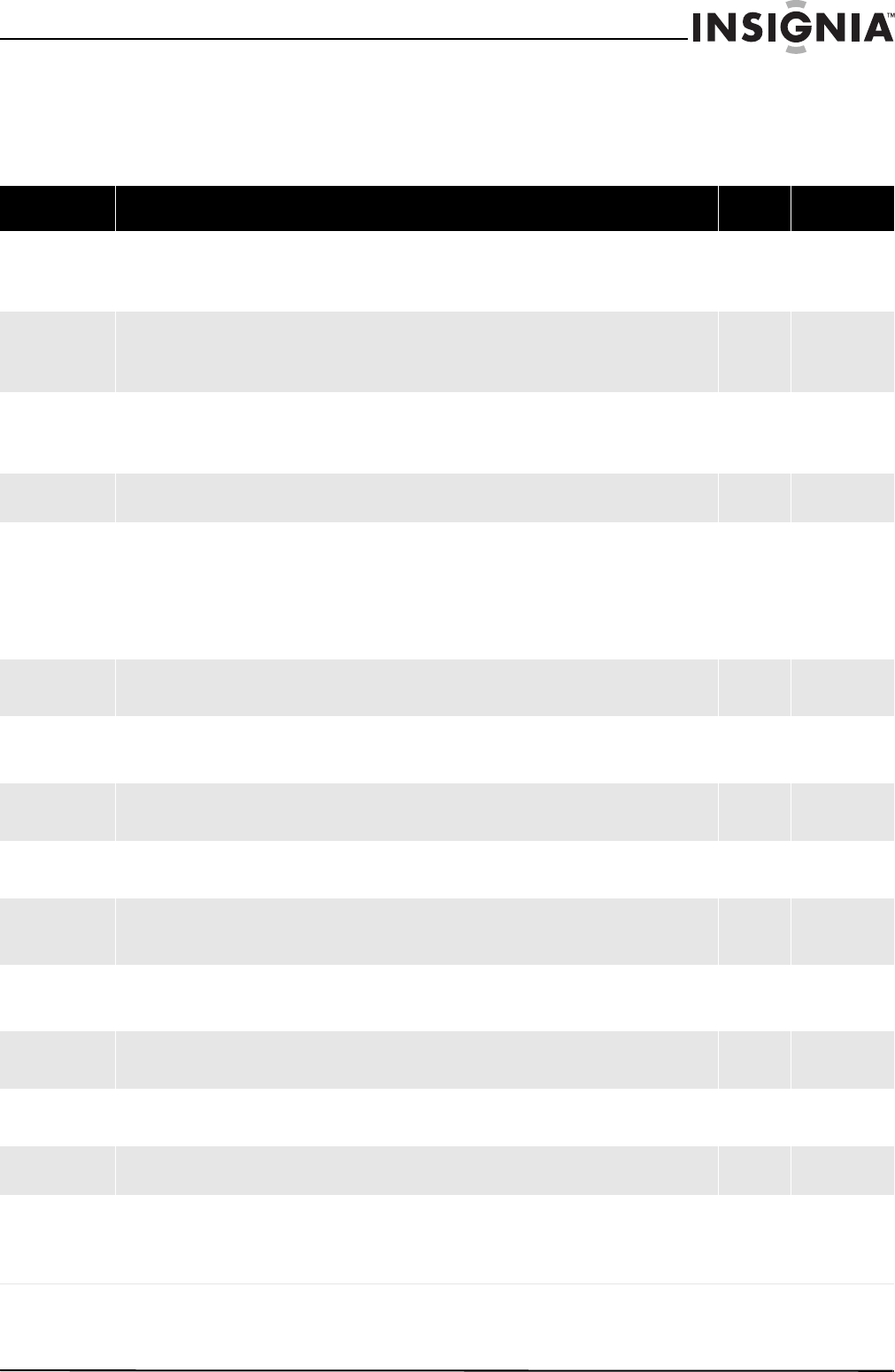
17
Insignia NS-HTIB51A 5.1 Channel Home Theater System
www.insigniaproducts.com
Listening modes
These listening modes become available when one
of the buttons described in “Selecting a listening
mode” on page 16 are pushed. The optional modes
available depend on which button is pushed.
1
Dolby Digital is used for Blu-ray discs.
2
The receiver can use the DSD signal from HDMI IN. Setting the output on the player side to PCM might provide better sound to the player.
3
Depending on the input source, DTS is used.
Listening Mode Description
Input
Source
Speaker Layout
Direct (Direct)
In this mode, audio from the input source is output without surround-sound processing. The “Sp Config (Speaker
Configuration)” (presence of speakers), “Sp Distance (Speaker Distance)” and “A/V Sync (A/V Sync)” settings are enabled,
but much of the processing set via AUDIO is disabled. See “Using advanced setup” on page 19 for more details.
MONO
STEREO
5.1ch
7.1ch
2.1, 3.1, 5.1
Stereo (Stereo)
Sound is output by the front left and right speakers and subwoofer. MONO
STEREO
5.1ch
7.1ch
2.1, 3.1, 5.1
Mono (Mono)
Use this mode when watching an old movie with a mono soundtrack, or use it with the foreign language soundtracks
recorded in the left and right channels of some movies. It can also be used with DVDs or other sources containing
multiplexed audio, such as karaoke DVDs.
MONO
STEREO
5.1ch
7.1ch
2.1, 3.1, 5.1
Multichannel
(Multich)
Multichannel This mode is for use with PCM multichannel sources. 5.1ch
7.1ch
3.1, 5.1
Dolby Pro Logic II
(PL II Movie)
(PL II Music)
(PL II Game)
Dolby Pro Logic II Dolby Pro Logic II expands any 2-channel source for 5.1-channel playback. It provides a very natural and
seamless surround-sound experience that fully envelops the listener. As well as music and movies, video games can also
benefit from the dramatic spatial effects and vivid imaging.
• Dolby PLII Movie–Use this mode with DVDs and videos that bear the Dolby Surround logo or TV shows that feature
Dolby Surround. You can also use this mode with stereo movies or TV shows and the receiver creates a 5.1 surround
mix from the 2-channel stereo.
• Dolby PLII Music–Use this mode to add 5.1 surround to stereo sources such as music CDs and DVDs.
• Dolby PLII Game–Use this mode when playing game discs.
STEREO 3.1, 5.1
Dolby Digital
(Dolby D)
Dolby Digital In this mode, audio from the input source is output without surround-sound processing.
Sp Config (Speaker Configuration), (presence of speakers), Crossover (Crossover Frequency), Sp Distance (Speaker Distance),
A/V Sync (A/V Sync), and much of the processing set via AUDIO are enabled. See “Using advanced setup” on page 19.
5.1ch 3.1, 5.1
Dolby Digital
Plus
1
(Dolby D+)
In this mode, audio from the input source is output without surround-sound processing.
Sp Config (Speaker Configuration), (presence of speakers), Crossover (Crossover Frequency), Sp Distance (Speaker Distance),
A/V Sync (A/V Sync), and much of the processing set via AUDIO are enabled. See “Using advanced setup” on page 19.
5.1ch
7.1ch
3.1, 5.1
Dolby TrueHD
(Dolby TrueHD)
In this mode, audio from the input source is output without surround-sound processing.
Sp Config (Speaker Configuration), (presence of speakers), Crossover (Crossover Frequency), Sp Distance (Speaker Distance),
A/V Sync (A/V Sync), and much of the processing set via AUDIO are enabled. See “Using advanced setup” on page 19.
5.1ch
7.1ch
3.1, 5.1
DTS (DTS)
In this mode, audio from the input source is output without surround-sound processing.
Sp Config (Speaker Configuration), (presence of speakers), Crossover (Crossover Frequency), Sp Distance (Speaker Distance),
A/V Sync (A/V Sync), and much of the processing set via AUDIO are enabled. See “Using advanced setup” on page 19.
5.1ch 3.1, 5.1
DTS-HD High
Resolution Audio
(DTS-HD HR)
In this mode, audio from the input source is output without surround-sound processing.
Sp Config (Speaker Configuration), (presence of speakers), Crossover (Crossover Frequency), Sp Distance (Speaker Distance),
A/V Sync (A/V Sync), and much of the processing set via AUDIO are enabled. See “Using advanced setup” on page 19.
5.1ch
7.1ch
3.1, 5.1
DTS-HD Master
Audio
(DTS-HD MSTR)
In this mode, audio from the input source is output without surround-sound processing.
Sp Config (Speaker Configuration), (presence of speakers), Crossover (Crossover Frequency), Sp Distance (Speaker Distance),
A/V Sync (A/V Sync), and much of the processing set via AUDIO are enabled. See “Using advanced setup” on page 19.
5.1ch
7.1ch
3.1, 5.1
DTS Express
(DTS Express)
In this mode, audio from the input source is output without surround-sound processing.
Sp Config (Speaker Configuration), (presence of speakers), Crossover (Crossover Frequency), Sp Distance (Speaker Distance),
A/V Sync (A/V Sync), and much of the processing set via AUDIO are enabled. See “Using advanced setup” on page 19.
STEREO
5.1ch
3.1, 5.1
DSD
2
(DSD)
In this mode, audio from the input source is output without surround-sound processing.
Sp Config (Speaker Configuration), (presence of speakers), Crossover (Crossover Frequency), Sp Distance (Speaker Distance),
A/V Sync (A/V Sync), and much of the processing set via AUDIO are enabled. See “Using advanced setup” on page 19.
5.1ch 3.1, 5.1
DTS 96/24
3
(DTS 96/24)
This mode is for use with DTS 96/24 sources. This is high-resolution DTS with a 96 kHz sampling rate and 24-bit resolution,
providing superior fidelity. Use it with DVDs that bear the DTS 96/24 logo.
5.1ch 3.1, 5.1
DTS Neo:6
(Neo : 6Cinema)
(Neo : 6Movie)
This mode expands any 2-channel source for up to 5.1-channel playback. It uses seven full-bandwidth channels of matrix
decoding for matrix-encoded material, providing a very natural and seamless surround sound experience that fully envelops
the listener.
• Neo:6 Cinema–Use this mode with any stereo movie (such as TV, DVD, VHS).
• Neo:6 Music–Use this mode with any stereo music source (such as CD, radio, cassette, TV, VHS, DVD).
STEREO 3.1, 5.1
NS-HTIB51A_10-0114_MAN_.book Page 17 Tuesday, April 13, 2010 10:19 AM


















